- Home
- L. Frank Baum
The Santa Claus Stories Page 2
The Santa Claus Stories Read online
Page 2
“Is that the reason your eyes are so big?” asked Dorothy.
“I suppose so,” returned the rabbit; “you see we have only our eyes and our ears and our legs to defend ourselves with. We cannot fight, but we can always run away, and that is a much better way to save our lives than by fighting.”
“Where is your home, bunny?” enquired the girl.
“I live in the ground, far down in a cool, pleasant hole I have dug in the midst of the forest. At the bottom of the hole is the nicest little room you can imagine, and there I have made a soft bed to rest in at night. When I meet an enemy I run to my hole and jump in, and there I stay until all danger is over.”
“You have told me what you see in summer,” continued Dorothy, who was greatly interested in the rabbit’s account of himself, “but what do you see in the winter?”
“In winter we rabbits,” said Bunny so shy,
“Keep watch to see Santa go galloping by.”
“And do you ever see him?” asked the girl, eagerly.
“Oh, yes; every winter. I am not afraid of him, nor of his reindeer. And it is such fun to see him come dashing along, cracking his whip and calling out cheerily to his reindeer, who are able to run even swifter than we rabbits. And Santa Claus, when he sees me, always gives me a nod and a smile, and then I look after him and his big load of toys which he is carrying to the children, until he has galloped away out of sight. I like to see the toys, for they are so bright and pretty, and every year there is something new amongst them. Once I visited Santa, and saw him make the toys.”
“Oh, tell me about it!” pleaded Dorothy.
“It was one morning after Christmas,” said the rabbit, who seemed to enjoy talking, now that he had overcome his fear of Dorothy, “and I was sitting by the road-side when Santa Claus came riding back in his empty sleigh. He does not come home quite so fast as he goes, and when he saw me he stopped for a word.
“‘You look very pretty this morning, Bun Rabbit,’ he said, in his jolly way; ‘I think the babies would love to have you to play with.’
“‘I don’t doubt it, your honor,’ I answered; ‘but they’d soon kill me with handling, even if they did not scare me to death; for babies are very rough with their playthings.’
“‘That is true,’ replied Santa Claus; ‘and yet you are so soft and pretty it is a pity the babies can’t have you. Still, as they would abuse a live rabbit I think I shall make them some toy rabbits, which they cannot hurt; so if you will jump into my sleigh with me and ride home to my castle for a few days, I’ll see if I can’t make some toy rabbits just like you.’
“Of course I consented, for we all like to please old Santa, and a minute later I had jumped into the sleigh beside him and we were dashing away at full speed toward his castle. I enjoyed the ride very much, but I enjoyed the castle far more; for it was one of the loveliest places you could imagine. It stood on the top of a high mountain and is built of gold and silver bricks, and the windows are pure diamond crystals. The rooms are big and high, and there is a soft carpet upon every floor and many strange things scattered around to amuse one. Santa Claus lives there all alone, except for old Mother Hubbard, who cooks the meals for him; and her cupboard is never bare now, I can promise you! At the top of the castle there is one big room, and that is Santa’s work-shop, where he makes the toys. On one side is his work-bench, with plenty of saws and hammers and jack-knives; and on another side is the paint-bench, with paints of every color and brushes of every size and shape. And in other places are great shelves, where the toys are put to dry and keep new and bright until Christmas comes and it is time to load them all into his sleigh.
“After Mother Hubbard had given me a good dinner, and I had eaten some of the most delicious clover I have ever tasted, Santa took me up into his work-room and sat me upon the table.
“‘If I can only make rabbits half as nice as you are,’ he said, ‘the little ones will be delighted.’ Then he lit a big pipe and began to smoke, and soon he took a roll of soft fur from a shelf in a corner and commenced to cut it out in the shape of a rabbit. He smoked and whistled all the time he was working, and he talked to me in such a jolly way that I sat perfectly still and allowed him to measure my ears and my legs so that he could cut the fur into the proper form.
“‘Why, I’ve got your nose too long, Bunny,’ he said once; and so he snipped a little off the fur he was cutting, so that the toy rabbit’s nose should be like mine. And again he said, ‘Good gracious! the ears are too short entirely!’ So he had to get a needle and thread and sew on more fur to the ears, so that they might be the right size. But after a time it was all finished, and then he stuffed the fur full of sawdust and sewed it up neatly; after which he put in some glass eyes that made the toy rabbit look wonderfully life-like. When it was all done he put it on the table beside me, and at first I didn’t know whether I was the live rabbit or the toy rabbit, we were so much alike.
“‘It’s a very good job,’ said Santa, nodding his head at us pleasantly; ‘and I shall have to make a lot of these rabbits, for the little children are sure to be greatly pleased with them.’
“So he immediately began to make another, and this time he cut the fur just the right size, so that it was even better than the first rabbit.
“‘I must put a squeak in it,’ said Santa.
“So he took a box of squeaks from a shelf and put one into the rabbit before he sewed it up. When it was all finished he pressed the toy rabbit with his thumb, and it squeaked so naturally that I jumped off the table, fearing at first the new rabbit was alive. Old Santa laughed merrily at this, and I soon recovered from my fright and was pleased to think the babies were to have such pretty playthings.
“‘After this,’ said Santa Claus, ‘I can make rabbits without having you for a pattern; but if you like you may stay a few days longer in my castle and amuse yourself.’
“I thanked him and decided to stay. So for several days I watched him making all kinds of toys, and I wondered to see how quickly he made them, and how many new things he invented.
“‘I almost wish I was a child,’ I said to him one day, ‘for then I too could have playthings.’
“‘Ah, you can run about all day, in summer and in winter, and enjoy yourself in your own way,’ said Santa; ‘but the poor little children are obliged to stay in the house in the winter and on rainy days in the summer, and then they must have toys to amuse them and keep them contented.’
“I knew this was true, so I only said, admiringly, ‘You must be the quickest and the best workman in all the world, Santa.’
“‘I suppose I am,’ he answered; ‘but then, you see, I have been making toys for hundreds of years, and I make so many it is no wonder I am skillful. And now, if you are ready to go home, I’ll hitch up the reindeer and take you back again.’
“‘Oh, no,’ said I, ‘I prefer to run by myself, for I can easily find the way and I want to see the country.’
“‘If that is the case,’ replied Santa, ‘I must give you a magic collar to wear, so that you will come to no harm.’
“So, after Mother Hubbard had given me a good meal of turnips and sliced cabbage, Santa Claus put the magic collar around my neck and I started for home. I took my time on the journey, for I knew nothing could harm me, and I saw a good many strange sights before I got back to this place again.”
“But what became of the magic collar?” asked Dorothy, who had listened with breathless interest to the rabbit’s story.
“After I got home,” replied the rabbit, “the collar disappeared from around my neck, and I knew Santa had called it back to himself again. He did not give it to me, you see; he merely let me take it on my journey to protect me. The next Christmas, when I watched by the road-side to see Santa, I was pleased to notice a great many of the toy rabbits sticking out of the loaded sleigh. The babies must have liked them, too, for every year since I have seen them amongst the toys.
“Santa never forgets me, and every time he passes he
calls out, in his jolly voice,
“‘A merry Christmas to you, Bun Rabbit! The babies still love you dearly.’”
The rabbit paused, and Dorothy was just about to ask another question when Bunny raised his head and seemed to hear something coming.
“What is it?” enquired the girl.
“It’s the farmer’s big shepherd dog,” answered the rabbit, “and I must be going before he sees me, or I shall have to run for my life. So good bye, Dorothy; I hope we shall meet again, and then I will gladly tell you more of my adventures.”
The next instant he had sprung into the wood, and all that Dorothy could see of him was a gray streak darting in and out amongst the trees.
The Life and Adventures of Santa Claus
Illustrated by Mary Cowles Clark
Original cover for The Life and Adventures of Santa Claus, 1902.
* * *
Original endpaper illustration for The Life and Adventures of Santa Claus, 1902.
* * *
Editor’s note: The Life and Adventures of Santa Claus was dedicated to Harry Neal Baum, one of L. Frank Baum’s four sons, who was 12 years old at the time the book was published.
To the extent possible, the text of this story, to include spellings such as “wilfully,” “good by,” and “can not” is left as Baum originally wrote it.
Have you heard of the great Forest of Burzee? Nurse used to sing of it when I was a child. She sang of the big tree-trunks, standing close together, with their roots intertwining below the earth and their branches intertwining above it; of their rough coating of bark and queer, gnarled limbs; of the bushy foliage that roofed the entire Forest, save where the sunbeams found a path through which to touch the ground in little spots and to cast weird and curious shadows over the mosses, the lichens and the drifts of dried leaves.
The Forest of Burzee is mighty and grand and awesome to those who steal beneath its shade. Coming from the sunlit meadows into its mazes it seems at first gloomy, then pleasant, and afterward filled with never-ending delights.
For hundreds of years it has flourished in all its magnificence, the silence of its inclosure unbroken save by the chirp of busy chipmunks, the growl of wild beasts and the songs of birds.
Yet Burzee has its inhabitants—for all this. Nature peopled it in the beginning with Fairies, Knooks, Ryls and Nymphs. As long as the Forest stands it will be a home, a refuge and a playground to these sweet immortals, who revel undisturbed in its depths.
Civilization has never yet reached Burzee. Will it ever, I wonder?
Once, so long ago our great-grandfathers could scarcely have heard it mentioned, there lived within the great Forest of Burzee a wood-nymph named Necile. She was closely related to the mighty Queen Zurline, and her home was beneath the shade of a wide-spreading oak. Once every year, on Budding Day, when the trees put forth their new buds, Necile held the Golden Chalice of Ak to the lips of the Queen, who drank therefrom to the prosperity of the Forest. So you see she was a nymph of some importance, and, moreover, it is said she was highly regarded because of her beauty and grace.
When she was created she could not have told; Queen Zurline could not have told; the great Ak himself could not have told. It was long ago when the world was new and nymphs were needed to guard the forests and to minister to the wants of the young trees. Then, on some day not remembered, Necile sprang into being; radiant, lovely, straight and slim as the sapling she was created to guard.
Her hair was the color that lines a chestnut-bur; her eyes were blue in the sunlight and purple in the shade; her cheeks bloomed with the faint pink that edges the clouds at sunset; her lips were full red, pouting and sweet. For costume she adopted oak-leaf green; all the wood-nymphs dress in that color and know no other so desirable. Her dainty feet were sandal-clad, while her head remained bare of covering other than her silken tresses.
Necile’s duties were few and simple. She kept hurtful weeds from growing beneath her trees and sapping the earth-food required by her charges. She frightened away the Gadgols, who took evil delight in flying against the tree-trunks and wounding them so that they drooped and died from the poisonous contact. In dry seasons she carried water from the brooks and pools and moistened the roots of her thirsty dependents.
That was in the beginning. The weeds had now learned to avoid the forests where wood-nymphs dwelt; the loathsome Gadgols no longer dared come nigh; the trees had become old and sturdy and could bear the drought better than when fresh-sprouted. So Necile’s duties were lessened, and time grew laggard, while succeeding years became more tiresome and uneventful than the nymph’s joyous spirit loved.
Truly the forest-dwellers did not lack amusement. Each full moon they danced in the Royal Circle of the Queen. There were also the Feast of Nuts, the Jubilee of Autumn Tintings, the solemn ceremony of Leaf Shedding and the revelry of Budding Day. But these periods of enjoyment were far apart, and left many weary hours between.
That a wood-nymph should grow discontented was not thought of by Necile’s sisters. It came upon her only after many years of brooding. But when once she had settled in her mind that life was irksome she had no patience with her condition, and longed to do something of real interest and to pass her days in ways hitherto undreamed of by forest nymphs. The Law of the Forest alone restrained her from going forth in search of adventure.
While this mood lay heavy upon pretty Necile it chanced that the great Ak visited the Forest of Burzee and allowed the wood-nymphs—as was their wont—to lie at his feet and listen to the words of wisdom that fell from his lips. Ak is the Master Woodsman of the world; he sees everything, and knows more than the sons of men.
That night he held the Queen’s hand, for he loved the nymphs as a father loves his children; and Necile lay at his feet with many of her sisters and earnestly harkened as he spoke.
“We live so happily, my fair ones, in our forest glades,” said Ak, stroking his grizzled beard thoughtfully, “that we know nothing of the sorrow and misery that fall to the lot of those poor mortals who inhabit the open spaces of the earth. They are not of our race, it is true, yet compassion well befits beings so fairly favored as ourselves. Often as I pass by the dwelling of some suffering mortal I am tempted to stop and banish the poor thing’s misery. Yet suffering, in moderation, is the natural lot of mortals, and it is not our place to interfere with the laws of Nature.”
“Nevertheless,” said the fair Queen, nodding her golden head at the Master Woodsman, “it would not be a vain guess that Ak has often assisted these hapless mortals.”
Ak smiled.
“Sometimes,” he replied, “when they are very young—‘children,’ the mortals call them—I have stopped to rescue them from misery. The men and women I dare not interfere with; they must bear the burdens Nature has imposed upon them. But the helpless infants, the innocent children of men, have a right to be happy until they become full-grown and able to bear the trials of humanity. So I feel I am justified in assisting them. Not long ago—a year, maybe—I found four poor children huddled in a wooden hut, slowly freezing to death. Their parents had gone to a neighboring village for food, and had left a fire to warm their little ones while they were absent. But a storm arose and drifted the snow in their path, so they were long on the road. Meantime the fire went out and the frost crept into the bones of the waiting children.”
“Poor things!” murmured the Queen softly. “What did you do?”
“I called Nelko, bidding him fetch wood from my forests and breathe upon it until the fire blazed again and warmed the little room where the children lay. Then they ceased shivering and fell asleep until their parents came.”
“I am glad you did thus,” said the good Queen, beaming upon the Master; and Necile, who had eagerly listened to every word, echoed in a whisper: “I, too, am glad!”
“And this very night,” continued Ak, “as I came to the edge of Burzee I heard a feeble cry, which I judged came from a human infant. I looked about me and found, close to the Fores
t, a helpless babe, lying quite naked upon the grasses and wailing piteously. Not far away, screened by the Forest, crouched Shiegra, the lioness, intent upon devouring the infant for her evening meal.”
“And what did you do, Ak?” asked the Queen, breathlessly.
“Not much, being in a hurry to greet my nymphs. But I commanded Shiegra to lie close to the babe, and to give it her milk to quiet its hunger. And I told her to send word throughout the Forest, to all beasts and reptiles, that the child should not be harmed.”
“I am glad you did thus,” said the good Queen again, in a tone of relief; but this time Necile did not echo her words, for the nymph, filled with a strange resolve, had suddenly stolen away from the group.
Swiftly her lithe form darted through the Forest paths until she reached the edge of mighty Burzee, when she paused to gaze curiously about her. Never until now had she ventured so far, for the Law of the Forest had placed the nymphs in its inmost depths.
Necile knew she was breaking the Law, but the thought did not give pause to her dainty feet. She had decided to see with her own eyes this infant Ak had told of, for she had never yet beheld a child of man. All the immortals are full-grown; there are no children among them. Peering through the trees Necile saw the child lying on the grass. But now it was sweetly sleeping, having been comforted by the milk drawn from Shiegra. It was not old enough to know what peril means; if it did not feel hunger it was content.
Softly the nymph stole to the side of the babe and knelt upon the sward, her long robe of rose leaf color spreading about her like a gossamer cloud. Her lovely countenance expressed curiosity and surprise, but, most of all, a tender, womanly pity. The babe was newborn, chubby and pink. It was entirely helpless. While the nymph gazed, the infant opened its eyes, smiled upon her, and stretched out two dimpled arms. In another instant Necile had caught it to her breast and was hurrying with it through the forest paths.

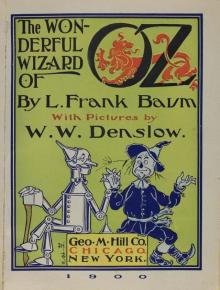 The Wonderful Wizard of Oz
The Wonderful Wizard of Oz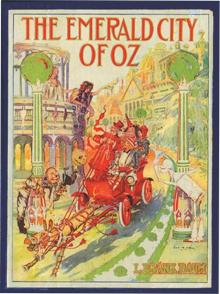 The Emerald City of Oz
The Emerald City of Oz The Story of Peter Pan, Retold from the fairy play by Sir James Barrie
The Story of Peter Pan, Retold from the fairy play by Sir James Barrie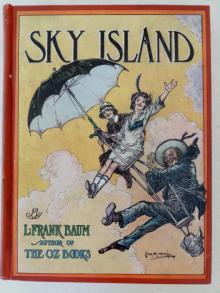 Sky Island
Sky Island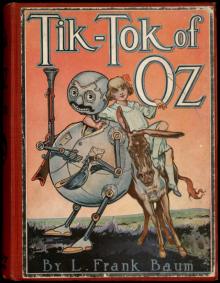 Tik-Tok of Oz
Tik-Tok of Oz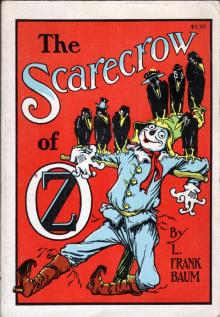 The Scarecrow of Oz
The Scarecrow of Oz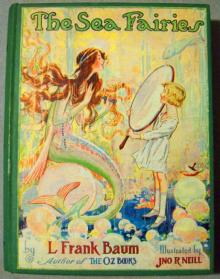 The Sea Fairies
The Sea Fairies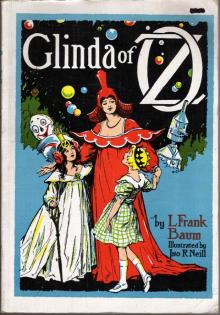 Glinda of Oz
Glinda of Oz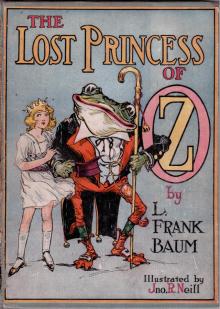 The Lost Princess of Oz
The Lost Princess of Oz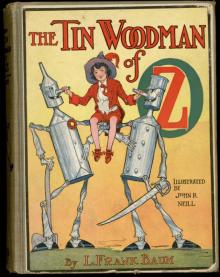 The Tin Woodman of Oz
The Tin Woodman of Oz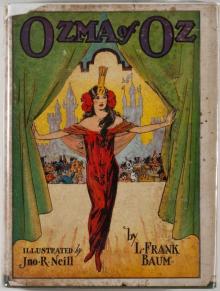 Ozma of Oz
Ozma of Oz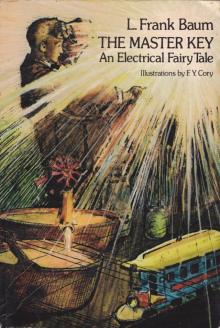 The Master Key
The Master Key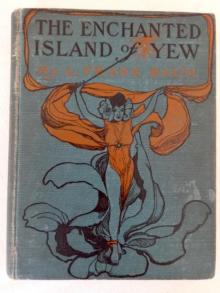 The Enchanted Island of Yew
The Enchanted Island of Yew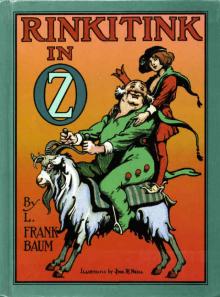 Rinkitink in Oz
Rinkitink in Oz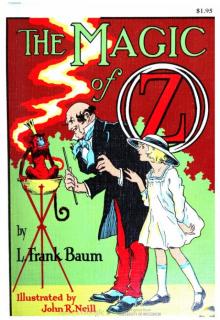 The Magic of Oz
The Magic of Oz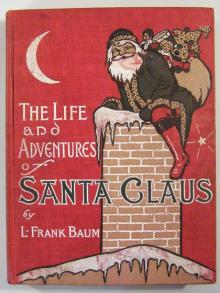 The Life and Adventures of Santa Claus
The Life and Adventures of Santa Claus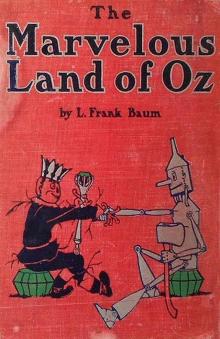 The Marvelous Land of Oz
The Marvelous Land of Oz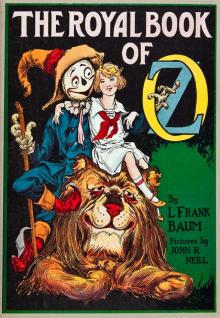 The Royal Book of Oz
The Royal Book of Oz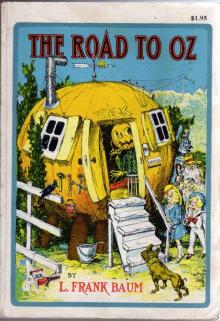 The Road to Oz
The Road to Oz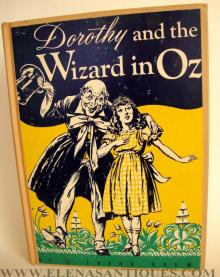 Dorothy and the Wizard in Oz
Dorothy and the Wizard in Oz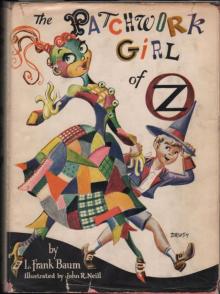 The Patchwork Girl of Oz
The Patchwork Girl of Oz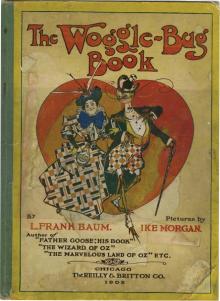 The Woggle-Bug Book
The Woggle-Bug Book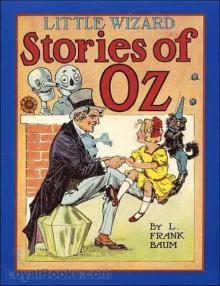 Little Wizard Stories of Oz
Little Wizard Stories of Oz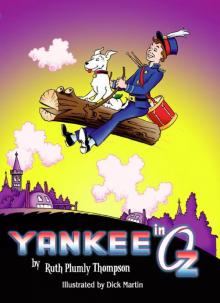 Yankee in Oz
Yankee in Oz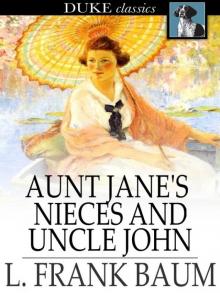 Aunt Jane's Nieces and Uncle John
Aunt Jane's Nieces and Uncle John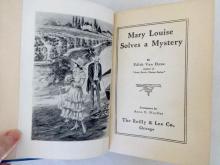 Mary Louise
Mary Louise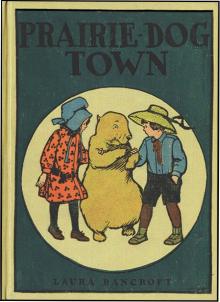 Prairie-Dog Town
Prairie-Dog Town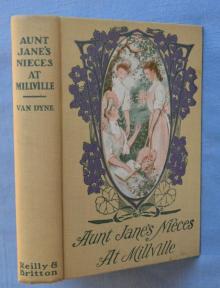 Aunt Jane's Nieces at Millville
Aunt Jane's Nieces at Millville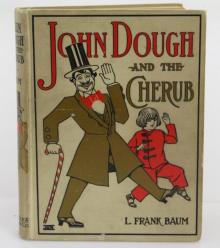 John Dough and the Cherub
John Dough and the Cherub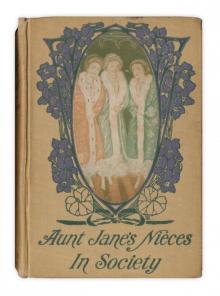 Aunt Jane's Nieces in Society
Aunt Jane's Nieces in Society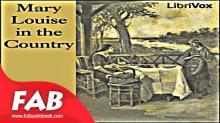 Mary Louise in the Country
Mary Louise in the Country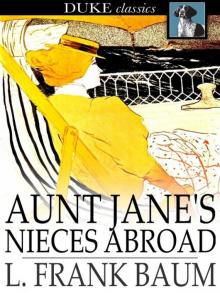 Aunt Jane's Nieces Abroad
Aunt Jane's Nieces Abroad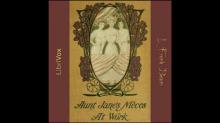 Aunt Jane's Nieces at Work
Aunt Jane's Nieces at Work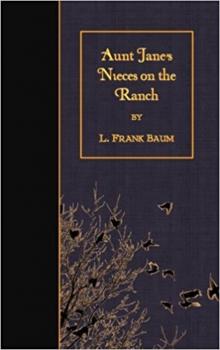 Aunt Jane's Nieces on the Ranch
Aunt Jane's Nieces on the Ranch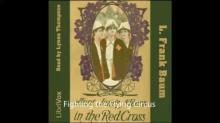 Aunt Jane's Nieces in the Red Cross
Aunt Jane's Nieces in the Red Cross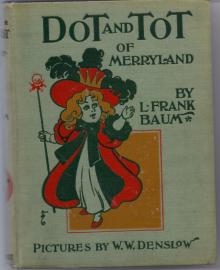 Dot and Tot of Merryland
Dot and Tot of Merryland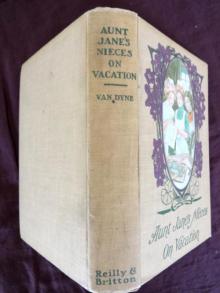 Aunt Jane's Nieces on Vacation
Aunt Jane's Nieces on Vacation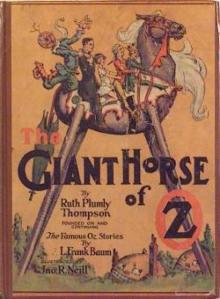 The Giant Horse Of Oz
The Giant Horse Of Oz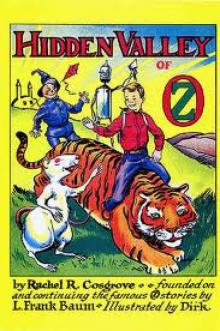 The Hidden Valley of Oz
The Hidden Valley of Oz Mary Louise and the Liberty Girls
Mary Louise and the Liberty Girls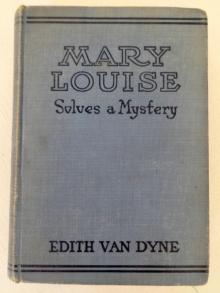 Mary Louise Solves a Mystery
Mary Louise Solves a Mystery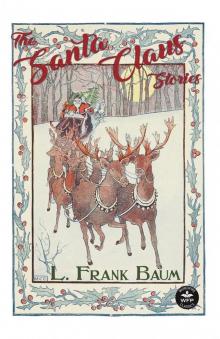 The Santa Claus Stories
The Santa Claus Stories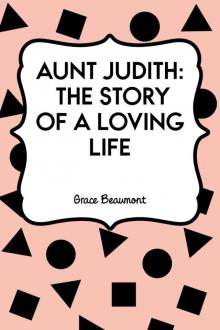 Aunt Judith: The Story of a Loving Life
Aunt Judith: The Story of a Loving Life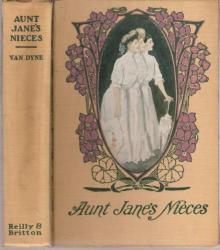 Aunt Jane's Nieces
Aunt Jane's Nieces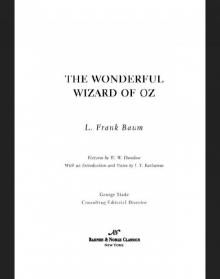 Wonderful Wizard of Oz (Barnes & Noble Classics Series)
Wonderful Wizard of Oz (Barnes & Noble Classics Series)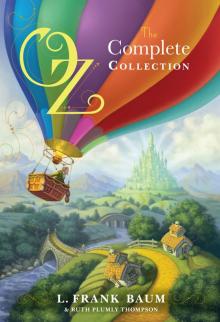 Oz, The Complete Collection
Oz, The Complete Collection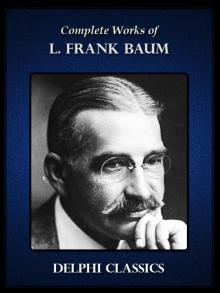 Complete Works of L. Frank Baum
Complete Works of L. Frank Baum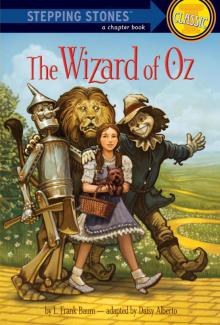 The Wizard of Oz
The Wizard of Oz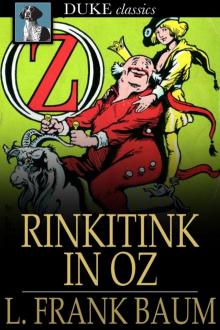 Oz 10 - Rinkitink in Oz
Oz 10 - Rinkitink in Oz